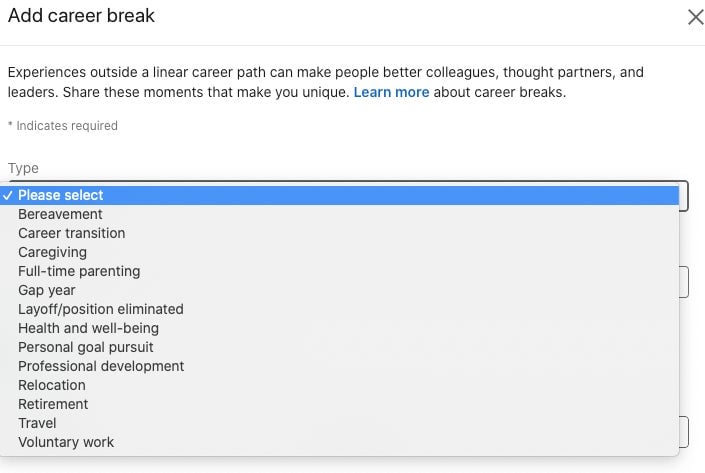Can you add “parenting” to your resume now? LinkedIn says yes
LinkedIn users now have a tool to explain gaps in their resume.


LinkedIn users now have a tool to explain gaps in their resume.
In the employment history section of LinkedIn profiles there’s a new option to add a “career break,” and choose from a dropdown menu of reasons to explain the hiatus. Reasons, and there are many of them, include things like full-time parenting; bereavement; caregiving; personal goal pursuit; and layoff/position eliminated.

Recruiters say career breaks are becoming more common
On a practical level, having the ability to keep your resume timeline intact is important since screener bots often scan and disqualify resumes—or profiles pulled from LinkedIn—that show a gap without explanation. Recruiters recommend that people find ways to explain breaks to improve their odds of being hired.
But the symbolism here is also meaningful. Could this change reflect enlightened attitudes about taking extended breaks from work?
The practice is nothing new, of course. In a recent global survey of more than 22,000 people, LinkedIn found that 62% of people globally have taken a break from their career at some point in their lives.
Still, the company believes returnees are being assessed differently now. LinkedIn data show that the number of US job postings on the site that mention career breaks or “returnships”—the ad might reference hiring initiatives for people rejoining the workforce after a break of two years or more, for example—jumped by 63% in 2021 compared with 2020, and by 100% compared with 2018. In a survey, half of hiring managers said that career breaks are becoming more common and slightly less than half (46%) said they see job seekers who have taken career breaks as an untapped talent pool.
The
re’s no shame in quitting or losing a job
The strain of working through the covid crisis has left a mark. Surveys have shown soaring levels of burnout, anxiety, and dissatisfaction among workers. The US has seen record-high quits rates. All of which has served to normalize career breaks.
For parents, especially working mothers, taking time off has traditionally been read as a sign that they aren’t dedicated to their career. It’s ironic because the skills people develop as parents—multitasking, empathy, time management for example—may in fact be the skills most critical to work.
Two years after covid’s arrival, companies may finally be ready to admit what has always been true about managing life and work: If someone needs downtime for caregiving, to improve their mental health, or to recover from the emotional toll of a layoff, they should probably win points for self-awareness rather than be penalized.
Quartz at Work is available as a newsletter. Click here to get The Memo delivered directly to your inbox.